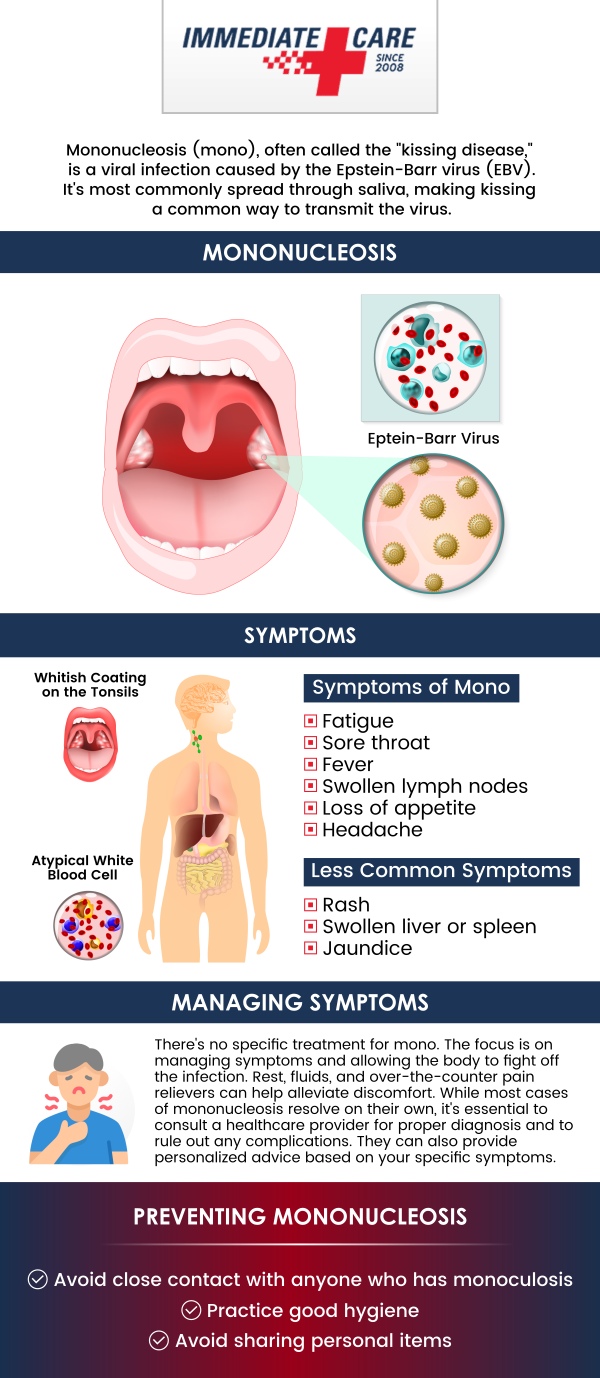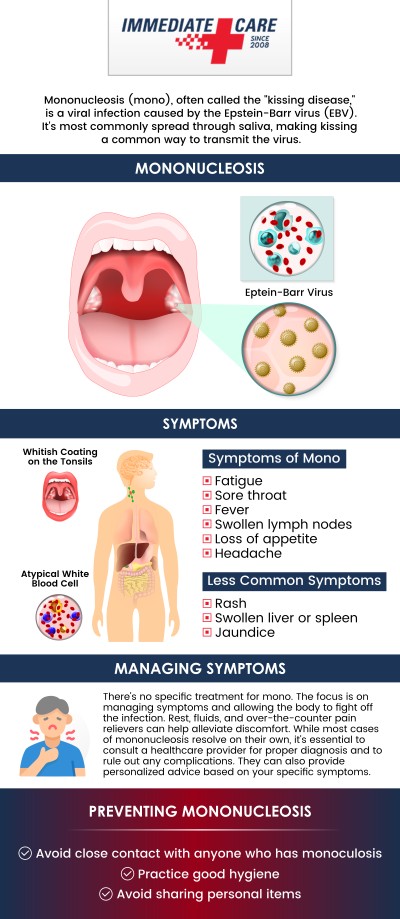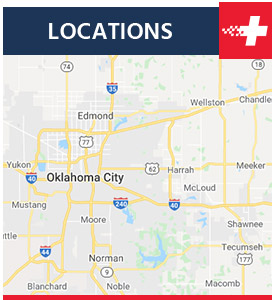Mononucleosis Symptoms & Treatment in OKC
Learn about mononucleosis (mono) symptoms like fatigue, sore throat, and fever. Get the facts on how mono is diagnosed and the effective treatments for managing symptoms and a smooth recovery from our providers at Immediate Care of Oklahoma. For more information, call us now or book an appointment online. We have convenient locations to serve in Oklahoma City, OK.


Table of Contents:
What is mononucleosis?
How Immediate Care of Oklahoma Can Help?
What virus most commonly causes mono?
Who is most at risk for getting mono?
How long after exposure to the virus do symptoms typically appear?
Mononucleosis, commonly called “mono” or the “kissing disease,” is a contagious illness frequently seen in teenagers and young adults, but it can affect people of any age. This infection is usually caused by the Epstein-Barr virus (EBV) and spreads through saliva—often through kissing, but also by sharing drinks, food, or utensils.
Recognizing the Symptoms
Mono often presents with symptoms such as:
● Severe fatigue
● Sore throat
● Fever
● Swollen lymph nodes (especially in the neck or armpits)
● Occasionally, an enlarged spleen, headaches, skin rash, or swollen tonsils
Symptoms may appear four to six weeks after exposure and can last for several weeks.
If you or your child are experiencing symptoms of mononucleosis, Immediate Care of Oklahoma is here to help. Our experienced healthcare providers will, perform a thorough physical examination, discuss your symptoms and medical history and order necessary blood tests to confirm the diagnosis. While there is no specific cure for mono, our team will work with you to manage your symptoms, offering guidance on:
● Rest and hydration
● Over-the-counter pain relievers and fever reducers
● Activity restrictions, such as avoiding contact sports, to prevent complications like spleen rupture
● Convenient, Compassionate Care When You Need It
At Immediate Care of Oklahoma, we understand how disruptive mono can be, especially for students and active individuals. Our walk-in clinics are open seven days a week, making it easy to get prompt evaluation and support—no appointment necessary.
While EBV is the primary cause, other viruses, like cytomegalovirus (CMV), can occasionally produce similar symptoms, though these are less common. Typical symptoms of mono include extreme fatigue, sore throat, fever, swollen lymph nodes, and sometimes an enlarged spleen.
If you or your child are experiencing these symptoms, our providers at Immediate Care of Oklahoma can help. We’ll perform a thorough physical examination and may recommend blood tests to confirm the diagnosis. Our team is committed to providing prompt, accurate care and helping you manage symptoms for a smooth recovery.
At Immediate Care of Oklahoma, we frequently see cases of infectious mononucleosis—commonly called “mono” or the “kissing disease.” Mono is caused by the Epstein-Barr virus (EBV) and is especially prevalent among teenagers and young adults, particularly those aged 15 to 24. This higher risk is often linked to common behaviors in this age group, such as close socializing, kissing, and sharing drinks or utensils, which can easily spread the virus through saliva.
We also see increased risk among college students and military personnel in Oklahoma who live in dormitories or other close quarters, making it easier for mono to spread in these environments. People with weakened immune systems—including those undergoing chemotherapy, living with HIV/AIDS, or taking immunosuppressive medications—are at higher risk for complications from mono and may require more careful monitoring and care.
While children can contract mono, their symptoms are often milder or even go unnoticed, so it’s most often adolescents and young adults who experience the classic, recognizable symptoms. Most people are exposed to EBV at some point in life, but if you or your child begin to experience symptoms like fever, sore throat, swollen glands, or unusual fatigue, Immediate Care of Oklahoma is here to help. We offer prompt evaluation, testing, and guidance to help you recover safely and comfortably.
After being exposed to a virus, the time it takes for symptoms to appear—known as the incubation period—can vary. For many common viral infections, such as the flu or COVID-19, symptoms typically develop within two to fourteen days after exposure, with most people noticing signs of illness between three and seven days. However, this timeframe can differ depending on the specific virus and your individual health.
During the incubation period, you may not feel sick or show any symptoms, but you can still be contagious and able to spread the virus to others. That’s why it’s important to monitor your health if you believe you’ve been exposed to a virus.
At Immediate Care of Oklahoma, our medical team is here to help. If you start to notice symptoms like fever, cough, sore throat, or body aches, or if you’re concerned about a recent exposure, visit one of our convenient locations for prompt evaluation and care. We offer rapid testing for common respiratory viruses, including flu and COVID-19, and can provide guidance on isolation, treatment, and steps to protect your family and community. Your health and peace of mind are our top priorities—walk in or schedule a visit today if you need medical assistance after a possible exposure. We serve patients from West Moore OK, Norman (HealthPlex) OK, Norman (24th) OK, Edmond OK, Yukon OK, I-240 & Sooner RD OK, Tecumseh OK, and Bethany OK.


Additional Services You May Need
▸ Urgent Care Services
▸ Illness + Injuries
▸ On Site Lab + X-Ray
▸ Helpful Health
▸ Motor Vehicle Accidents
▸ Drug Testing
▸ MRO
▸ UTI Treatment
▸ Employment Physicals
▸ Workers Comp
▸ Strep Throat Treatment
▸ Pregnancy Testing
▸ Blood Pressure Testing
▸ Urinalysis
▸ Mononucleosis Treatment
▸ Suture Removal
▸ Respiratory Syncytial Virus
▸ OccMed








